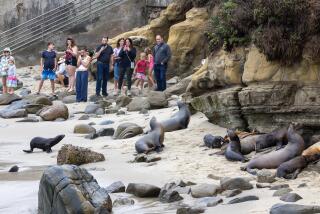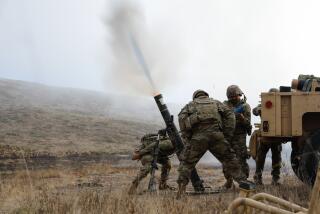Foxes Doing Well After Capture at Naval Base
Five healthy and “very frisky” red foxes were at a Tujunga wildlife center Sunday after their weekend capture at the Seal Beach Naval Weapons Station.
The foxes, which weigh between 15 and 20 pounds, appear to be in good health, although they were uncooperative with handlers Sunday, said Martine Colette, who owns the Wildlife Waystation, a private rescue and rehabilitation center in Los Angeles County.
The trapping began Saturday as part of a program to remove 50 to 60 foxes that are threatening the survival of two endangered bird species at a wildlife refuge within the borders of the weapons station.
They have been preying on breeding pairs of light-footed clapper rails and California least terns at the 1,100-acre Seal Beach National Wildlife Refuge.
Once Common on Coast
The birds, once common along the California coast, are on the federal list of endangered species. Federal law requires their protection.
Biologists and environmentalists have criticized the Navy and the U.S. Fish and Wildlife Service for failing to act quickly after learning of the fox problem at least two years--and two nesting seasons--ago.
It is believed that only five pairs of breeding clapper rails remain of a once prolific colony of about 200 pairs.
Colette said she is seeking permits to place the captured foxes in the wild in another state, perhaps in the Midwest, where the animal is more common.
At least seven states have refused to grant the necessary permits out of fear that the Seal Beach foxes might carry diseases that could harm native wildlife.
“We’re still going to petition fish and game agencies in other states, maybe in the East, where they are also prevalent,” Colette said.
She described the foxes as looking “a lot” larger than 15 pounds because of their thick fur.
Handlers were unable to determine whether the foxes were male or female because they were taken from their natural habitat and were “not cooperative,” Colette added.
The Tujunga group has agreed to take about 12 of the foxes. An Irvine park will take one animal, and North Crop Animal Care in Anaheim has agreed to take one or possibly more in a few weeks, officials have said.
Officials at the naval base declined to comment Sunday about the trapping program.
But Curt Sandberg, acting public relations officer for the weapons station, said last week that the trapper--whose name was not released--would set out cage traps, snares, and padded leg-hold traps in an effort to prevent injury.
More to Read
Sign up for Essential California
The most important California stories and recommendations in your inbox every morning.
You may occasionally receive promotional content from the Los Angeles Times.










